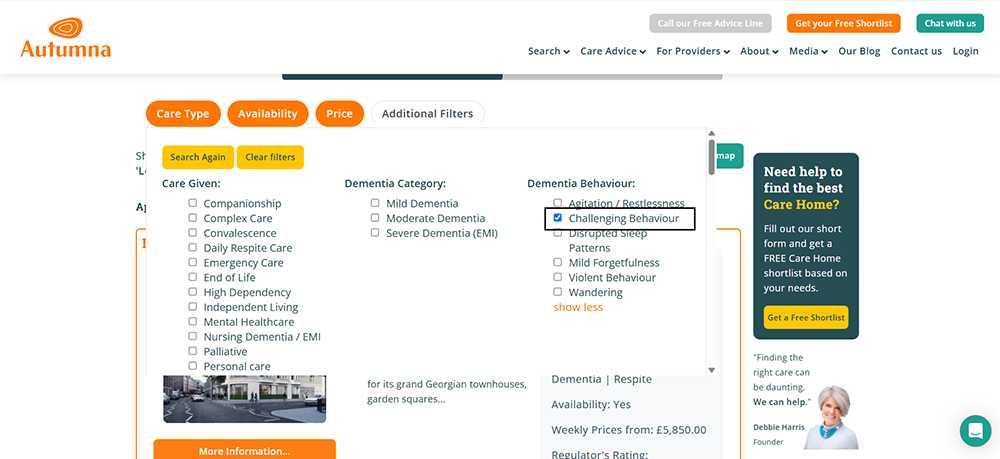Posted by Janine Griffiths
How to find care homes for challenging behaviour

Finding the right care homes for challenging behaviour isn’t just about ticking boxes—it’s about ensuring a loved one feels safe, understood, and supported in an environment designed for their needs.
Whether someone is living with dementia, a brain injury, or a complex mental health condition, challenging behaviours can emerge as a way of communicating distress, discomfort, or confusion. The right care home doesn’t just manage these behaviours; it transforms the care experience by creating a space where individuals can thrive, not just exist.
But how do you find a care home that truly understands the complexities of challenging behaviour? Where do you start, and what should you look for? The answer lies in knowing what makes a care provider exceptional—and using the right tools to uncover those that excel in this area.
In this guide, we’ll explore what makes a care home suitable for managing challenging behaviour, the key features to look for, and how to make the right choice for your loved one. Let’s get started.
Understanding challenging behaviour needs
Challenging behaviour is often a symptom, not the root cause. It’s a signal—a way for someone to express pain, frustration, fear, or confusion when words fail them. Whether it’s aggression, agitation, withdrawal, or repetitive actions, these behaviours aren’t just reactions; they’re calls for help. And answering that call requires more than just patience—it demands expertise, empathy, and an environment designed to meet complex needs.
This is why finding the right care home for challenging behaviour is so important.
Common reasons for challenging behaviour
Every individual’s experience is unique. Dementia may cause sudden outbursts, autism may lead to sensory overload, brain injuries may trigger impulsivity, and severe anxiety can manifest in withdrawal or distress. A one-size-fits-all approach simply doesn’t work. True care goes beyond managing behaviour—it seeks to understand it.
How the best care homes for challenging behaviour de-escalate outbursts
The best care homes for challenging behaviour can help to prevent them. They anticipate triggers, tailor care plans, and create surroundings that reduce stress and promote calm. They invest in highly trained staff who know how to de-escalate difficult situations with compassion. They use therapeutic approaches—music, reminiscence, sensory rooms, structured routines—to bring comfort and stability to residents.
Choosing a specialist care home isn’t just about safety—it’s about dignity. It’s about finding a place where challenging behaviour isn’t seen as a problem to be managed, but as a part of a person’s journey that deserves understanding, care, and respect. In the next section, we’ll explore exactly what to look for when searching for a care home that can provide this level of support.
What to look for in care homes for challenging behaviour
Choosing the right care homes for challenging behaviour isn’t just about finding a place that “can manage” difficult behaviours—it’s about finding a home that understands them, anticipates them, and transforms care into something truly life-enhancing. So, what makes a care home stand out in this space? And how can you be sure it’s the right fit for your loved one?
The must-have features of a specialist care home
Below are some of the key features to look for in care homes for challenging behaviour:
- Expertly trained staff – Look for care homes where staff receive ongoing specialist training in managing challenging behaviour. Techniques such as de-escalation strategies, sensory therapy, and personalised behavioural support can make all the difference.
- A purposefully designed environment– The right setting can either trigger stress or create calm. Secure outdoor spaces, quiet areas, and structured layouts help minimise agitation and keep residents feeling safe.
- Person-centred care plans – No two people experience challenging behaviour the same way. A home that tailors its care to each individual—adapting routines, communication methods, and daily activities—will provide the most positive experience.
- Multidisciplinary support – Access to specialists like psychologists, occupational therapists, and behaviour support teams ensures a holistic approach to care, rather than a reactive one.
The key questions to ask
Asking the right questions will help you separate homes that merely “cope” from those that truly care. Here’s what to ask—and why it matters:
What experience does the staff have with challenging behaviour?
Training matters, but experience is what builds confidence and instinct. A care team that has successfully supported individuals with complex needs will know how to respond calmly, adapt approaches, and provide proactive care.
What therapeutic approaches do you use to support residents?
Great care homes don’t just manage behaviour—they improve quality of life. Whether it’s sensory therapy, reminiscence work, music sessions, or structured routines, these approaches help reduce distress and bring comfort.
How is the care home environment adapted for safety and wellbeing?
A well-designed environment can prevent distress before it even begins. Ask about quiet spaces, secure outdoor areas, lighting adjustments, and sensory rooms—all of which help create a soothing atmosphere.
What is the staff-to-resident ratio, especially at peak times?
Challenging behaviour often requires quick, individualised responses. A high staff-to-resident ratio ensures there’s always someone available to offer support, prevent escalation, and provide meaningful engagement.
Choosing a care home is never just a checklist exercise—it’s about finding a place that feels right, where compassion meets expertise, and where challenging behaviour is met with understanding, not frustration. The next step? Using Autumna to pinpoint the very best options, so you can make an informed, confident decision.
Use Autumna to find care homes for challenging behaviour
Finding the right care homes for challenging behaviour can feel overwhelming. With so many options, how do you know which homes truly specialise in supporting individuals with complex needs? How do you separate marketing promises from real, high-quality care? This is where Autumna changes the game.
Head over to our homepage search bar and select care homes. Next input your location and press enter.

You will then see a list of care homes in your area. To make things easier, Autumna allows you to filter for homes that specialise in challenging behaviour, ensuring that every option you consider is equipped to provide the right support.
Go to Additional Filters and under Dementia Behaviours, select Challenging Behaviour. You can also tick other applicable behaviours that may apply.

Alternatively, to get even more bespoke support, try our shortlisting tool. Answer a few questions to view a list of care homes that are even more closely matched to your needs.

You can also call us and speak to one of our friendly team members on 01892 335 330.
Receive a Free Care Home Shortlist!
Let our expert team of advisers get your search off to a great start.
Tell us a little about your needs and we'll send you a bespoke shortlist of care homes! Click the button below to begin, it takes just a few minutes.
Other articles to read
From the blog

Older Persons Care Advice
How to shortlist care homes in Exeter
April 17th, 2025
Looking for an adult day care centre near you? Discover how to find safe, joyful care for your loved one—and support for yourself—on Autumna.

Older Persons Care Advice
What is Discharge to Assess?
April 16th, 2025
Discover how Discharge to Assess (D2A) supports faster recovery, reduces hospital stays, and how Autumna helps simplify finding the right care.

Older Persons Care Advice
What are the benefits of person-centred care?
April 9th, 2025
Discover the benefits of person-centred care—from improved wellbeing to better outcomes—for individuals, families, and care providers alike.
Frequently Asked Questions
Yes, some care homes may not have the expertise or staff training to support complex behaviours. That’s why it’s crucial to find a home specifically equipped for these needs.
Yes. Some homes offer general dementia care, while others specialise in complex behaviours linked to brain injuries, autism, or severe anxiety. The right home depends on the individual’s needs.
Many care homes encourage family visits, communication with staff, and involvement in care planning to ensure consistency and emotional support.
If a home isn’t providing adequate support, families can request a reassessment, explore alternative care options, or seek guidance from care directories like Autumna.
The UK's largest & most detailed directory of elderly care and retirement living options
10,434
Care Homes
12,399
Home Care Services
1,670
Live-in Care Services
1,826
Retirement Living Developments
Autumna is the UK's largest and most comprehensive later-life living & elderly care directory. Our detailed search facility and team of expert advisors can help you find the best care homes, nursing homes, retirement homes, retirement villages, home care, and live-in care services for you or your loved one's needs. Our website is free to use, we are proudly independent, and we never take referral fees.






